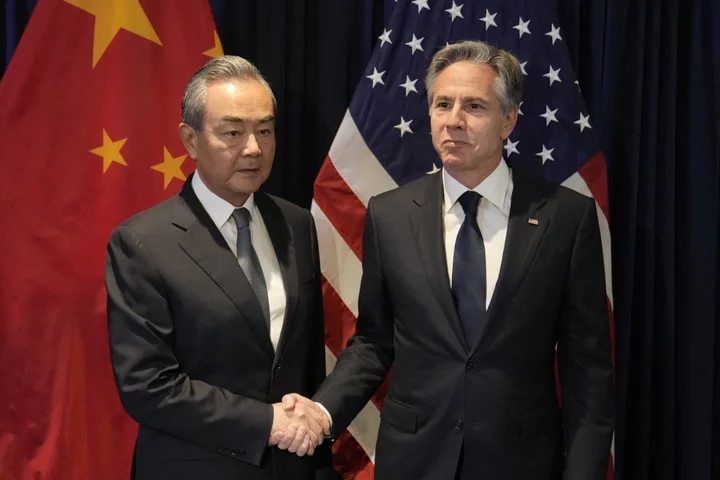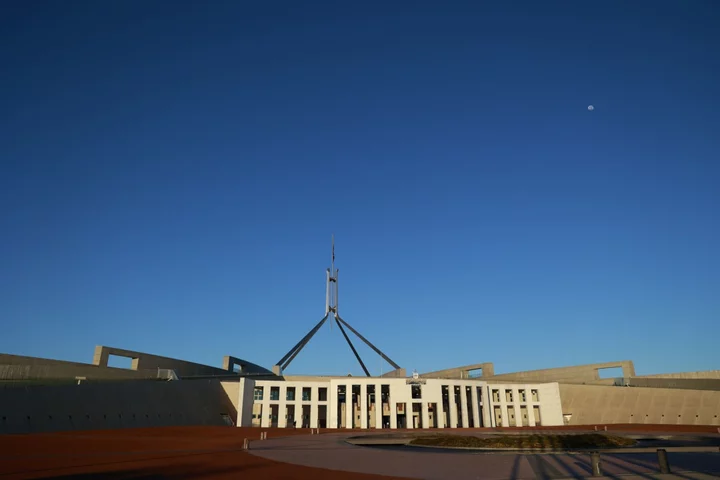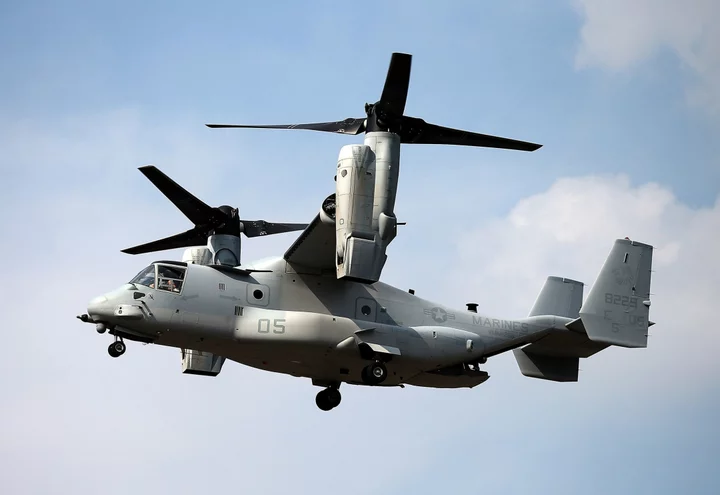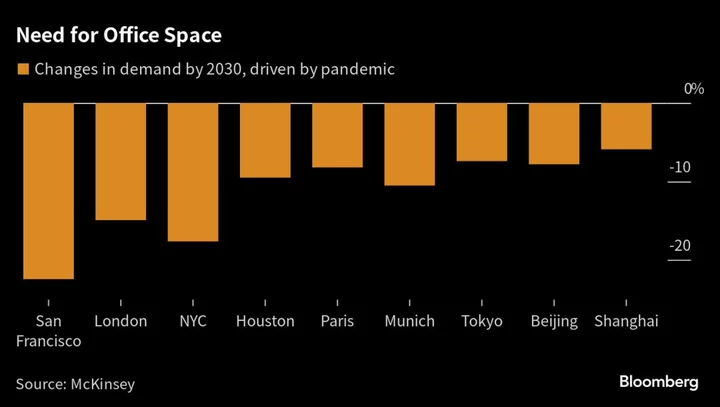Tensions over regional security issues flared at a regional forum in Jakarta that brought together among the world’s top diplomats while the US-China divide remained evident.
US Secretary of State Antony Blinken sought to reinforce that American presence in the Indo-Pacific is crucial for regional security. He joined China’s top diplomat Wang Yi and Russian Foreign Minister Sergei Lavrov in a closed-door regional forum.
The mood during the Association of Southeast Asian Nations meetings were underscored by wide concerns over territorial disputes, an assertive North Korea, the war in Ukraine and crisis in Myanmar that shows no signs of resolve.
The highlight of the gathering was a meeting between Blinken and Wang on the sidelines of the forum on Thursday, seeking to maintain dialogue even after ties were roiled anew by allegations that Chinese hackers had breached US officials’ email accounts. The two sides also aired their differences with the US raising the hacking issue, while Wang said the US should stop suppressing China’s economic development.
Southeast Asian leaders are seeking to cool tensions between its two most important partners, while the grouping continues to press countries like Russia to back away from ever using nuclear weapons as Moscow presses ahead with its war in Ukraine.
(All times local)
Indonesia Calls for Food Security Cooperation Beyond Asean (7:44 p.m.)
Foreign Minister Retno Marsudi said her government has proposed an Asean Leaders’ Declaration on Strengthening Food Security and Nutrition in Response to Crisis to be endorsed at the 43rd Summit. She also said cooperation on efforts to ensure availability of food and supply chain resilience in times of crisis should be extended with partner countries such as India, Canada, Russia, Australia and Turkey.
Borrell Says EU to Increase Navy Presence in Asia (7:13 p.m.)
The European Union plans to increase its navy presence in Asia to support freedom of navigation, its foreign affairs chief Josep Borrell said at a briefing on the sidelines of Asean meetings. He flagged North Korea’s missile launch and the violence in Myanmar as among key concerns.
South Korea proposed a common security strategy during its meeting with EU and “we’re working on that,” Borrell said. On Myanmar, he said there’s “strong concern” that the issue is dividing Asean, urging the group to ban the country’s junta from its meetings.
Borrell highlighted a “productive meeting” with China’s Wang Yi, adding that the NATO Summit wasn’t brought up.
US, Japan, South Korea Condemn North’s Provocations (6:58 p.m.)
The recent ballistic missile launch by North Korea was the focus of comments by the foreign ministers of the U.S., Japan and South Korea during a trilateral meeting on the sidelines of the Asean forum.
There is “no greater challenge” than these “provocations” by North Korea, Blinken said, opening the meeting. The three countries are joined “resolutely” on security in a region that will shape “much of the future.”
Japan’s Hayashi Yoshimasa said “we strongly condemn” the missile launch while his South Korean counterpart Park Jin said North Korea’s “provocations will not go unpunished.”
Singapore Says Region ‘Not Forming Blocs’ (6:25 p.m.)
Singapore’s Foreign Affairs Minister Vivian Balakrishnan said that Southeast Asia would not choose sides between big powers, and that it was “not forming blocs,” something that China has accused the US and its allies of trying to do in Asia.
He also said the tone of the conversations during the Asean meetings, he felt, “were more positive, more constructive, more amenable to dialogue.”
On Myanmar, the minister said “Aung San Suu Kyi still remains the key pivot for any solution” to the ongoing conflict there. “You cannot have any solution without her participation.”
Blinken Seeks End to Violence in Myanmar, North Korea’s ‘Unlawful Weapons’ (2:58 p.m.)
“In Myanmar, we must press the military regime to stop the violence, to implement Asean’s five-point consensus, to support the return to democratic governance,” the State Secretary said, citing the US’s more than $74 million in additional humanitarian relief, including almost $61 milion to support Rohingyas fleeing violence in the area.
Blinken also sought an end to North Korea’s “unlawful weapons of mass destruction program and ballistic missile launches.”
US Is One of Region’s Most Important Partners, Asean Says (2:38 p.m.)
US, being one of Asean’s most important partners, is seen to continue to support the region’s centrality and reinforce the group’s “position as epicentrum of growth,” Indonesia’s Marsudi said at the US-Asean meeting.
“Strategic approaches of inclusive cooperation and habit of dialogue must always be upheld by Asean, and we do hope our partners will also do the same,” Marsudi was quoted as saying, in the readout. “As Asean’s comprehensive strategy partner, the US holds the key to making this aspiration a reality.”
Wong Urges Transparency on Solomon Pacts (1:46 p.m.)
Australian Foreign Minister Penny Wong told Wang Yi during a meeting that China should be transparent about its security pacts with the Solomon Islands that have drawn concerns from Washington and Canberra alike.
“We understand that countries made their sovereign decisions,” she told reporters on Friday on the sidelines of the Asean meetings. “However, the security of the Pacific is something we all have an interest in and so we urge there to be transparency.”
Blinken Says US Presence in Region Crucial for Stability (12:26 p.m.)
US presence in the region is important for peace and stability, Blinken said during his meeting with Indonesian Foreign Minister Retno Marsudi, adding that the two countries share a vision of “free, secure, prosperous, connected, resilient” Southeast Asia. “What we’re doing together is trying to make that vision real in a very concrete way,” the US official said.
East Asia Ministers Warn of Cold War Symptoms (10:15 a.m.)
Indonesian’s foreign minister emphasized that the Indo-Pacific region is not a battlefield, citing a number of statements that the area is experiencing “symptoms of a cold war.”
“Our region must remain stable, and we intend to keep it that way,” Marsudi said. “The Indo-Pacific must not only become a net contributor of growth, but also a net contributor for peace that projects our paradigm of collaboration to other regions.”
Jokowi Calls on Asean Delegates to Be Ice Breaker (9:30 a.m)
Indonesian President Joko Widodo called on Asean delegates to solve crucial problems in the region, not to make them worse. Asean must not become a place of competition or become a proxy for any country, he said.
The leader, known as “Jokowi,” drew on a local proverb, saying: “We can be winners without humiliating others, without defeating others. Therefore, I invite all of us to be honorable winners.”
China Says Ties with Australia Improved (8:42 a.m.)
Wang said the relationship between Beijing and Canberra has stopped spiraling and returned to stability at a meeting with Australia’s Wong in Jakarta on Thursday, according to a statement posted on China’s foreign ministry website.
China’s top diplomat urged both sides to stick to resume exchanges and cooperation across all levels, and handle differences appropriately. Wang expressed hopes that Australia will be able to provide a fair, just and non-discriminatory business environment for Chinese companies in the country.
China Tells Blinken Actions Needed to Stabilize Ties (11:39 p.m)
Wang told Blinken that the US should stop suppressing China’s economic, trade and technology development, according to a government statement from the Asian nation. He also urged the US to end sanctions against China during that meeting.
Asean Calls for End of Hostilities in Ukraine (11:00 p.m.)
Foreign ministers from the regional group called on the immediate cessation of hostilities in Ukraine and the need for a genuine dialogue, according to a joint communiqué.
“With regard to Ukraine, as for all nations, we continued to reaffirm our respect for sovereignty, political independence, and territorial integrity,” the statement said.
Group Condemns Violence in Myanmar (11:00 p.m.)
Asean has condemned the continued acts of violence in Myanmar, one of its member states, including the use of air strikes, artillery shelling, and destruction of public facilities, according to a joint communiqué by Asean foreign ministers. All parties should “immediately halt indiscriminate violence, denounce any escalation, and create a conducive environment for the delivery of humanitarian assistance and inclusive national dialogue,” the statement said.
The group has been trying to pursue a so-called five-point peace proposal for Myanmar that would include ending violence and committing to free elections but there hasn’t been much progress.
--With assistance from Xiao Zibang, Faris Mokhtar, Daniel Flatley and Michelle Jamrisko.
Author: Philip J. Heijmans and Chandra Asmara









